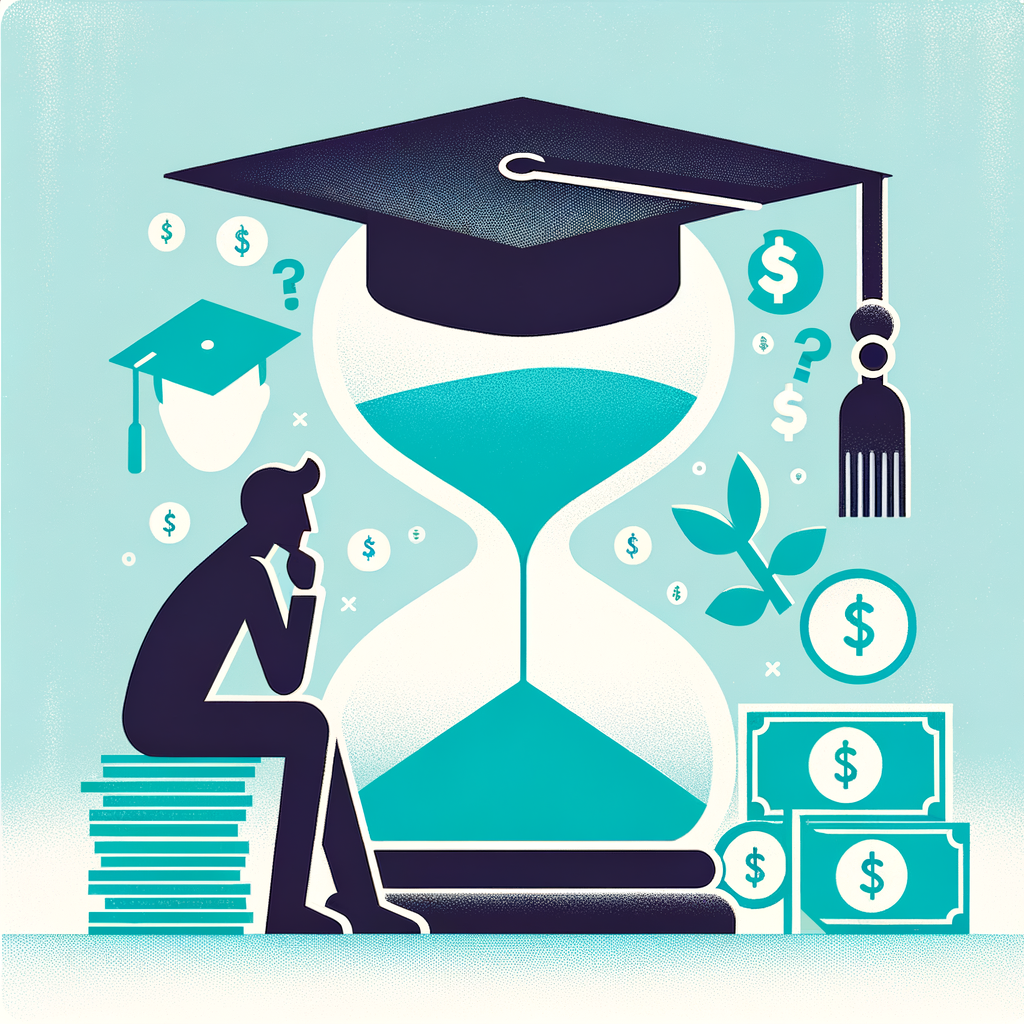Advertiser Disclosure
Last update: December 16, 2024
7 minutes read
How Long Does it Typically Take to Pay Off Student Loans?
How long does it take to pay off student loans? Learn what influences student loan repayment timelines and discover effective strategies to accelerate your payoff period.

By Brian Flaherty, B.A. Economics
Edited by Rachel Lauren, B.A. in Business and Political Economy
Learn more about our editorial standards



By Brian Flaherty, B.A. Economics
Edited by Rachel Lauren, B.A. in Business and Political Economy
Learn more about our editorial standards
You might be wondering, “How long does it typically take to pay off my student loans?” Knowing the difference between various repayment plans will help you understand your situation. We'll dive into different repayment scenarios and what you can do to shorten your payoff period.

Key takeaways
- Student loans can take 5 to 25 years or more to repay, depending on loan type and repayment plan
- Repayment strategies like larger payments and refinancing can shorten your loan term
- Income-driven and extended repayment plans offer lower monthly payments but longer terms
How long does it typically take to pay off student loans?
How long does it typically take to pay off student loans? The time it takes to repay student loans can span from 5 to over 25 years, depending on various factors like the loan type and repayment plan.
On average, student loan borrowers take about 20 years to pay off their loans. With a monthly payment of more than $400, however, it can take bachelor’s degree earners fewer than 10 years to pay off their loans. Depending upon the balance borrowed and interest rate, though, this figure can extend significantly.
Here's a list of factors affecting your repayment time:
- Loan amount: The more you borrow, the longer it takes.
- Monthly payments: Paying more than the minimum each month significantly reduces your payoff time.
- Interest rates: Higher interest rates can increase the repayment period.
43% of the 43 million federal student loan borrowers are on a standard 10-year plan, but not everyone meets these terms. For those in extended or income-driven plans, the repayment period can stretch to 25 years, with opportunity for forgiveness at the end. Explore your federal loan options more deeply to find out what suits you best.
Private loans vary widely, generally taking between 3 to 30 years to repay. Factors like credit scores and income levels play a crucial role.

TuitionHero Tip
If you ever feel stuck with high interest rates, consider student loan refinancing to make your payments more manageable and potentially shorten your debt term.
Factors influencing student loan payoff time
Several key elements play into how quickly you can eliminate your debt.
These include the loan type, interest rate, and how much you can pay each month. Let's dig into these factors more.
Loan type and repayment plans
Federal student loans offer various repayment plans, including standard, income-driven, and graduated options. Standard plans typically span 10 years.
- Income-Driven Repayment Plans: These plans adjust your payments based on your income, usually extending the repayment period to 20-25 years given the lower monthly payment.
- Graduated Repayment Plans: These start with lower payments and increase every two years, also usually extending up to 10 years.
Interest rates and monthly payments
Interest rates significantly affect your payoff time. Higher rates mean higher total payments and usually lengthen the repayment period.
For instance:
- Federal loans: Rates can range from 5.5% for undergraduate loans to 8.05% or more for PLUS loans.
- Private loans: These can vary widely, from 4.5% to 12.6% or higher, depending on your credit score and the lender’s policies.
To get a lower rate, take a look at these tips.
Different strategies to pay off student loans faster
Thinking about how to pay off student loans faster? You're not alone.
Many borrowers want to cut down repayment time. Here's how:
Making larger payments
Paying more than the minimum each month can drastically reduce your loan term. Even an extra $50 a month can save you thousands in interest.
- Example: If you pay $350 a month instead of $300, you could shorten your loan term from 10 to just over 9 years (assuming a balance of $30K and a 5.5% rate).
Loan refinancing
If you're stuck with high-interest rates, refinancing can be a game-changer. Refinancing at a lower rate can help you repay debt faster and save on interest.
- Case study: Refinancing a $50,000 loan at 7.25% instead of 8.4% can cut years off your repayment period.
How demographics affect student loan payoff time
Gender and race disparities
Unfortunately, your gender and race can affect how long it takes you to repay student loans due to income disparities.
- Female graduates typically take longer to repay loans than their male counterparts due to lower average incomes. On average, it takes women around two years longer to pay off their debt than the average male graduate.
- Black graduates face even greater challenges. They usually take over twice as long as white graduates to pay off their loans.
Understanding financial planning can help mitigate some of these challenges.
Impact of job sectors
Different professions also have varying effects on repayment timelines. For instance, medical graduates usually struggle due to high debt levels versus their starting salaries.
- Medical graduates: It can take several decades (possibly up to 45 years) for some to fully repay their student loans due to their high initial debt load and low starting salaries during residency.
Compare private student loans now
TuitionHero simplifies your student loan decision, with multiple top loans side-by-side.
Compare Rates
Extended repayment options for federal loans
Federal loans offer extended repayment plans for people with larger debt amounts. Here’s how it works:
- Eligibility: Loans over $30,000 obtained after October 7, 1998 can qualify.
- Term length: You can extend repayment up to 25 years.
- Effect: Monthly payments are lower, but total interest paid over time will be higher.
Repayment periods by total loan debt
Consolidation loans also serve as an option, combining multiple loans into one, potentially reducing monthly payments but usually extending the repayment period.
- Less than $7,500: 10 years
- $7,500-9,999: 12 years
- $10,000-19,999: 15 years
- $20,000-39,999: 20 years
- $40,000-$59,999: 25 years
- Greater than $60,000: 30 years
Repayment period scenarios
Here's a concise summary of the repayment periods based on different conditions and scenarios:
Loan Type | Repayment Plan | Monthly Payment | Time to Repay |
|---|---|---|---|
Federal | Standard | ~$400 | 10 years |
Federal | Income-Driven | % of income | 20-25 years |
Private | Varies | Depends on balance | 3-30 years |
Federal | Extended | Fixed or graduated | Up to 25 years |
This table highlights different repayment periods and scenarios, providing a clear comparison of how long it might take to pay off your student loans based on varying conditions.
Dos and don'ts of refinancing student loans
Refinancing student loans can be an effective strategy to manage and reduce your debt. However, it's essential to follow some best practices to make the process work in your favor. Below is a table of the dos and don’ts of refinancing student loans to guide you.
Do
Compare multiple lenders for the best rate.
Check your credit score before applying.
Read lender reviews and borrower experiences.
Refinance your private loans first.
Consider fees associated with new loans.
Don't
Don’t overlook the fine print in loan terms.
Don’t refinance without understanding your new monthly payment.
Don’t count on variable interest rates remaining low.
Don’t ignore federal loan benefits, like student loan forgiveness.
Don’t lock into a term that feels unaffordable long-term.

Advantages and disadvantages of private student loans
Private student loans offer another route for funding higher education but come with their own set of pros and cons. Here's a breakdown of the advantages and disadvantages to help you decide.
- Lower interest rates: If you have a good credit score, you can sometimes access more competitive rates.
- Flexible repayment options: Some private lenders offer multiple repayment plans.
- Quick disbursement: The application process is usually faster than federal loans.
- Credit-based approval: Your credit score can significantly affect your interest rate.
- Fewer forgiveness options: Private loans don’t offer the same forgiveness programs as federal loans.
- Limited deferment and forbearance: Fewer options exist for pausing payments during hardship.

Why trust TuitionHero
At TuitionHero, we empower students and parents with financial resources for student loan repayment. Our tools and educational resources help you understand repayment plans and pay off loans faster. We connect you with reputable lenders for loans and refinancing, as well as offer support for FAFSA and student-friendly credit card options. Join us in making smart financial decisions for a debt-free future.
Frequently asked questions (FAQ)
Starting to repay your student loans while still in school is a smart move. Most federal loans offer a grace period of six months post-graduation, but making small payments during school can reduce the overall interest you'll owe. Check with your lender to see if they allow early payments without penalties.
While refinancing can offer lower interest rates, be cautious of hidden fees like origination or application fees. It's crucial to read the terms and conditions, and ask the lender for a list of any potential fees involved. Comparing multiple lenders is another way to ensure you're getting the best deal.
Refinancing federal loans into private loans means you'll lose access to federal loan forgiveness programs. This is an important consideration, especially if you're working towards forgiveness under income-driven repayment plans. Evaluate your priorities and career plans before choosing to refinance.
Final thoughts
Navigating student loan repayment can feel overwhelming, especially with the various plans and options available. However, understanding your options, from standard repayment plans to refinancing, can significantly affect how long it takes to repay your debt.
At TuitionHero, we offer the tools and resources you need to make well-informed financial decisions, helping you manage and ultimately conquer your student loans. Whether you need help with student loans or refinancing options, we're here to make the process smoother. Let's take the first step together toward a debt-free future.
Source
Author

Brian Flaherty
Brian is a graduate of the University of Virginia where he earned a B.A. in Economics. After graduation, Brian spent four years working at a wealth management firm advising high-net-worth investors and institutions. During his time there, he passed the rigorous Series 65 exam and rose to a high-level strategy position.
Editor

Rachel Lauren
Rachel Lauren is the co-founder and COO of Debbie, a tech startup that offers an app to help people pay off their credit card debt for good through rewards and behavioral psychology. She was previously a venture capital investor at BDMI, as well as an equity research analyst at Credit Suisse.
At TuitionHero, we're not just passionate about our work - we take immense pride in it. Our dedicated team of writers diligently follows strict editorial standards, ensuring that every piece of content we publish is accurate, current, and highly valuable. We don't just strive for quality; we aim for excellence.
Related posts
While you're at it, here are some other college finance-related blog posts you might be interested in.
Shop and compare student financing options - 100% free!

Always free, always fast
TuitionHero is 100% free to use. Here, you can instantly view and compare multiple top lenders side-by-side.

Won’t affect credit score
Don’t worry – checking your rates with TuitionHero never impacts your credit score!

Safe and secure
We take your information's security seriously. We apply industry best practices to ensure your data is safe.
Finished scrolling? Start saving & find your private student loan rate today





